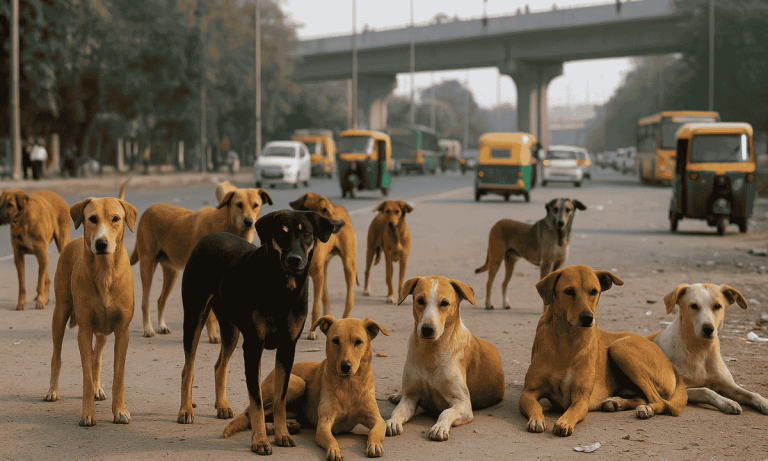It’s early morning. You’re walking the dog, coffee still cooling in your hand, when suddenly your loyal companion stops, nose down, and begins chewing—on grass. Not once, not by accident, but with the same intent you’d expect if you’d offered a strip of bacon.
You sigh, maybe tug the leash, maybe let it slide. And you wonder, like millions of other dog owners who’ve typed the same question into Google: why do dogs eat grass?
The curiosity isn’t trivial. This question consistently ranks as the most-searched dog behavior query worldwide, ahead of “why do dogs wag their tails” or “how long do dogs live.” Clearly, this little patch of lawn chewing taps into something bigger—our need to decode what’s going on inside the minds (and stomachs) of our four-legged friends.
A Mix of Instinct and Mystery
Veterinary researchers have chased this puzzle for decades, and the short answer is maddening: no single explanation fits every dog. What’s clear is that grass-eating isn’t unusual. Studies suggest that as many as 80% of dogs indulge in it regularly, with most showing no signs of illness afterward.
Some veterinarians frame it as instinctive behavior, a modern echo of ancestral wolves that consumed entire prey—including the stomach contents of herbivores. In this view, grass isn’t a mistake but a vestigial dietary fiber, a way to keep the gut moving.
Others argue it’s about self-medication. A dog with mild nausea may chew grass as a natural emetic, prompting a purge. Owners who’ve rushed to clean up the mess after a green-tinged vomit session can attest to this theory’s credibility.
But here’s the kicker: not all grass-eaters vomit afterward. In fact, most don’t. Which means grass is more than just a canine ipecac.
The Behavioral Angle
Step away from biology for a moment. Dogs, like people, get bored. The world is filled with scents and textures we barely notice, and to a dog, grass is a sensory buffet. The smell of dew, the feel of blades between teeth—it’s stimulation in its own right.
Behaviorists note that some dogs graze more when left alone in the yard, suggesting grass can be a boredom snack or even a way to seek attention. You scold, you tug the leash, and suddenly chewing grass becomes a guaranteed way to get a reaction.
What Science Actually Says
In 2008, a survey published in the journal Applied Animal Behaviour Science tried to put numbers on the phenomenon. Out of over 1,500 dogs observed, grass was the most common non-food item ingested. Importantly, fewer than 10% of dogs appeared sick before eating it, and fewer than 25% vomited afterward.
Translation: grass eating is mostly normal, not a sign of disease. The American Kennel Club echoes this, noting that unless your dog shows other symptoms—persistent vomiting, lethargy, appetite loss—occasional lawn snacking is rarely cause for alarm.
The Risks (Yes, There Are Some)
Of course, not all grass is created equal. Lawns treated with pesticides, herbicides, or chemical fertilizers can make grazing dangerous. Even untreated areas can harbor parasites or toxic plants. That’s why veterinarians urge owners to pay attention to context: is the grass clean? Is it sprayed? Is your dog compulsively eating large amounts?
Moderation matters. A nibble on morning walks? Usually harmless. A full salad bar session daily? Time to check in with your vet.
What Your Dog Might Be Saying
So what is your pup really telling you when they graze? The answer is layered:
- “I’m following instinct.” Generations of canine evolution left this quirk behind.
- “I might need some roughage.” Fiber helps digestion, and grass can fill the gap.
- “I’m curious or bored.” It’s something to do, a taste to explore, and a way to break monotony.
- “I don’t feel great.” On occasion, it’s a dog’s way of settling the stomach.
As an owner, your job isn’t to panic but to observe. Context matters more than the act itself.
Why We Care So Much
Perhaps the deeper question isn’t why dogs eat grass, but why we’re so fixated on understanding it. The answer may lie in the bond itself. Dogs live in our homes, sleep on our couches, and shadow us from room to room. Yet, for all that intimacy, they remain partly unknowable—creatures with instincts we can only guess at.
When they chew grass, they remind us of that mystery. It unsettles us, not because it’s harmful most of the time, but because it breaks the illusion that we fully understand them.
And so we Google. We swap stories on forums. We laugh, we worry, and we clean up after the aftermath.
The Takeaway for Owners
If your dog eats grass:
- Don’t panic. It’s common and usually harmless.
- Watch for patterns—frequency, context, and side effects.
- Make sure the grass isn’t treated with chemicals.
- If grazing becomes obsessive or accompanied by illness, talk to a vet.
Otherwise, maybe accept it for what it is: one more canine quirk, a reminder that beneath the domestication lies an animal still guided by instinct and curiosity.
Final Note: The next time you spot your dog snacking on the lawn, take a breath. Resist the urge to pull them away immediately. Watch instead. You might not get a definitive answer, but you’ll see something more important: a glimpse of the wild still humming quietly inside the animal who sleeps at your feet.



